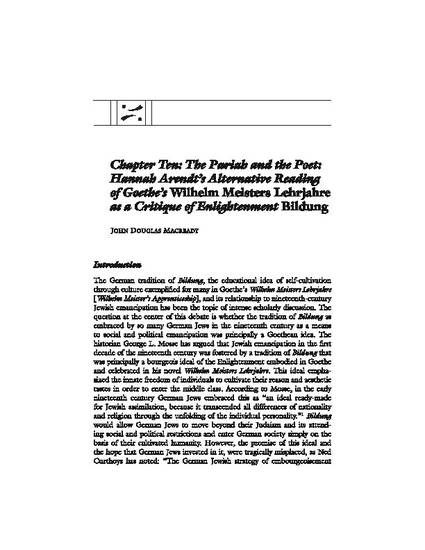
Contribution to Book
The Pariah and the Poet: Hannah Arendt’s Alternative Reading of Goethe’s «Wilhelm Meisters Lehrjahre» as a Critique of Enlightenment «Bildung»
Goethe’s «Bildung»: Dialog Between Tradition and Innovation
(2018)
Abstract
The German ideal of Bildung—the process of self-development through culture that Goethe dramatized in Wilhelm Meisters Lehrjahre—and its connection to the crises of Jewish emancipation in the nineteenth and twentieth centuries has been the topic of intense scholarly discussion. At issue is whether Bildung compromised Jewish identity. One of the earliest and strongest critics of Bildung was Hannah Arendt. Although Bildung was seen by many Jewish intellectuals, like Moses Mendelssohn, to be an answer to widespread anti-Judaism in European society, Arendt saw it as an apolitical concept that jeopardized Jewish emancipation in Europe. Arendt was skeptical of the promise of Bildung because it amounted to an amelioration of Jewish difference that enlightened German society found repugnant in order to allow Jews to enter society simply on the terms of their shared humanity. In short, Bildung offered a process for Jews to shed their pariah status in exchange for the status of assimilated parvenus. For Arendt, this exchange created a crisis for Jewish identity, facilitated anti-Semitism, and undermined the political significance of Jews in Europe. In The Origins of Totalitarianism and her intellectual biography of Rahel Varnhagen, Arendt argued that Goethe’s Wilhelm Meisters Lehrjahre was widely read as a model for nineteenth century Jewish assimilation to German society through the process of Bildung. Arendt’s critique of Bildung is often seen as a critique of Goethe; however, when Arendt’s discussions of Bildung in Goethe’s Lehrjahre are read n light of her early essays on Goethe and Rahel Varnhagen it becomes clear that Arendt read the Lehrjahre from the perspective of a stateless refugee and saw in Wilhelm’s ultimate failure to emancipate himself from the bourgeoisie a narrative paradigm for the ultimate failure of Jewish assimilation through Bildung. Her critique of Bildung is therefore not a critique of Goethe, but rather an appropriation of his keen insight into the vices and perils of Bildung.
Keywords
- Johann Wolfgang von Goethe,
- Hannah Arendt,
- Bildung,
- Education
Disciplines
Publication Date
Fall December 28, 2018
Publisher
Peter Lang
Citation Information
John Macready. "The Pariah and the Poet: Hannah Arendt’s Alternative Reading of Goethe’s «Wilhelm Meisters Lehrjahre» as a Critique of Enlightenment «Bildung»" New YorkGoethe’s «Bildung»: Dialog Between Tradition and Innovation (2018) p. 163 - 174 Available at: http://works.bepress.com/john-macready/2/
